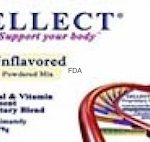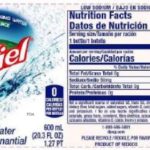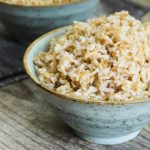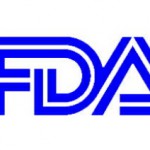Port Jefferson Station, NY, Cellect Products Inc. and Oglethorpe Ltd. are recalling lot #041907 of Cellect Unflavored Powder & Essentials Factor Cell Synergy Unflavored Powder. because they have unsafe levels of arsenic and lead. Long term exposure to inorganic arsenic is associated with skin disorders and increased risks for skin, bladder, and lung cancers. Long term exposure to lead can cause learning disabilities and lower IQ. No reports of adverse reactions have been received to date. Taking more than two servings daily of this drink mix product could result in an accumulation of lead in the body. Lead poisoning can damage the nervous system and internal organs. Acute lead poisoning can cause abdominal pain, nausea, vomiting, muscle weakness, diarrhea, weight loss, and bloody or … [Read more...]
Peñafiel Unflavored Mineral Spring Water Recalled For Arsenic
Keurig Dr. Pepper is recalling Peñafiel unflavored mineral spring water products that were imported from Mexico because of the present of violative levels of arsenic. Arsenic, when present in the diet at very high levels, well above those detected in recent samples of the product, is associated with many chronic illnesses, including cancer and developmental problems. Arsenic is found in nature, including aquifers that are sources of mineral water. The levels in the water can vary over time. Keurig Dr. Pepper has installed enhanced filtration systems at its facilities that produce this product, and the water now being produced is within regulatory guidelines. The recall does not state whether the arsenic is in the organic or inorganic form. Inorganic arsenic is generally more … [Read more...]
Consumer Reports Finds Arsenic in Bottled Water
Consumer Reports has found arsenic at unsafe levels in some brands of bottled water. The organization is urging the government to recall those brands and to implement better federal standards for this product. Many people around the country rely on bottled water because their tap water doesn't taste good or they don't trust its quality. Unfortunately, bottled water can have issues and be contaminated with unsafe compounds. One of those compounds is arsenic. Arsenic is found everywhere, in the soil, air, and water, and it is found in groundwater, the source for many bottled water brands. The World Health Organization (WHO) says that, when ingested, arsenic can cause arsenic poisoning, skin cancer, developmental problems, memory problems, diabetes, pulmonary disease, and … [Read more...]
New Study Finds Arsenic in Infant Rice Cereal
A new study conducted by Healthy Babies Bright Future (HBBF) has found that there is six times more arsenic in infant rice cereal than in other types of cereals. Arsenic is a heavy metal that can cause health problems including cancer, neurological problems, and reduced IQ. Rice contains more arsenic than other grains because of the way it grows. Rice paddies are flooded with water, which aids the absorption of the heavy metal through the roots of the plant. Rice plants absorb ten times more arsenic than other grains while they grow. And rice is grown where arsenic is abundant in the soil. The grain is often planted in old cotton fields in the southern United States, where arsenic pesticides were sprayed for years. Testing by Consumer Reports in 2012 first brought this issue to … [Read more...]
FDA Proposes Limit for Inorganic Arsenic in Infant Cereal
The FDA has proposed a limit for inorganic arsenic in infant rice cereal. Arsenic is a naturally occurring element that exists in both organic and inorganic forms. Inorganic arsenic is more toxic to the human body. Consumption of inorganic arsenic is associated with cancer, skin lesions, cardiovascular disease, and diabetes. Poor pregnancy outcomes and neurodevelopment toxicity are also concerns. In July 2013, the FDA released a draft quantitative assessment of lifetime risk of certain cancers associated with exposure to inorganic arsenic in apple juice. Guidance for industry keeps the level of inorganic arsenic in that product to 10 parts per billion. Rice products are a focus for the FDA because the plant takes up arsenic in the soil as it grows. Relative to body weight, rice … [Read more...]
FDA Withdraws Approval of Arsenic in Animal Feed
The FDA has announced it has withdrawn approval of all applications for nitarsone (an arsenic-based drug) in animal feed as of December 31, 2015. There are now no FDA-approved, arsenic-based drugs for use in food producing animals. Last April, the FDA announced it received a letter of commitment from Zoetis Animal Health that the company will suspend sales of Histostat, the commercial name for nitarsone. This was the only arsenic-based animal drug used in food animals. It is used for the prevention of disease in turkeys and chickens. Studies have found that organic arsenic, the less toxic form of the chemical used in these drugs, can transform into inorganic arsenic, which is a known carcinogen. In 2011, an FDA study found that higher levels of inorganic arsenic were in chicken … [Read more...]
Documents Show Possible Collusion Between FDA and Pfizer
Food & Water Watch has released documents, including draft press releases and emails, that they say shows the FDA colluded with the pharmaceutical company Pfizer to minimize the results of a study that links inorganic arsenic, which is a carcinogen, to the U.S. food supply. Food & Water Watch obtained the documents through the Freedom of Information Act. Communications between the government and Pfizer began before a 2011 announcement to suspend sales of roxarsone, an arsenic-based drug used in poultry feed. A 2007 study suggested that roxarsone converts into the most dangerous form of arsenic in chickens. Elevated levels of inorganic arsenic were found in the livers of chickens given the drug compared to chickens that never got it. Continued approval of roxarsone violates the … [Read more...]
Consumer Reports on Arsenic in Rice
Consumer Reports has released new data and guidelines for consumers about arsenic in rice. That organization's 2012 report found measurable levels of the heavy metal in almost all of the products they tested. People who are allergic to wheat, celiac patients, and those sensitive to gluten eat more rice and rice products. Arsenic is in two forms: inorganic and organic. Inorganic is more toxic and is classified as a carcinogen. It is naturally occurring, but humans put more arsenic into the environment through pesticides and poultry fertilizer. Chickens are fed organic arsenic to promote weight gain and growth on less food. The FDA stopped approval of most food animal drugs containing arsenic last year, but not all. The heavy metal stays in the soil for decades. And when animals eat … [Read more...]
In a Twist, China Bans U.S. Shellfish
We're used to hearing about how food from China is banned from entering the U.S., or that consumer and food safety groups oppose measures to bring food from that country here. But now China has turned the tables by banning all imports of West coast shellfish from its borders. The issue is paralytic shellfish poisoning toxins and arsenic found in geoduck clams harvested in Renton, Washington and Ketchikan in Alaska. No shellfish harvested on the entire West coast will be exported to China for the foreseeable future. The ban applies to clams, oysters, geoducks, and all bivalve shellfish harvested off Washington, Oregon, Alaska, and northern California. The health departments of those states routinely test for PSP and arsenic, as well as other parasites and bacteria. Officials with the … [Read more...]













